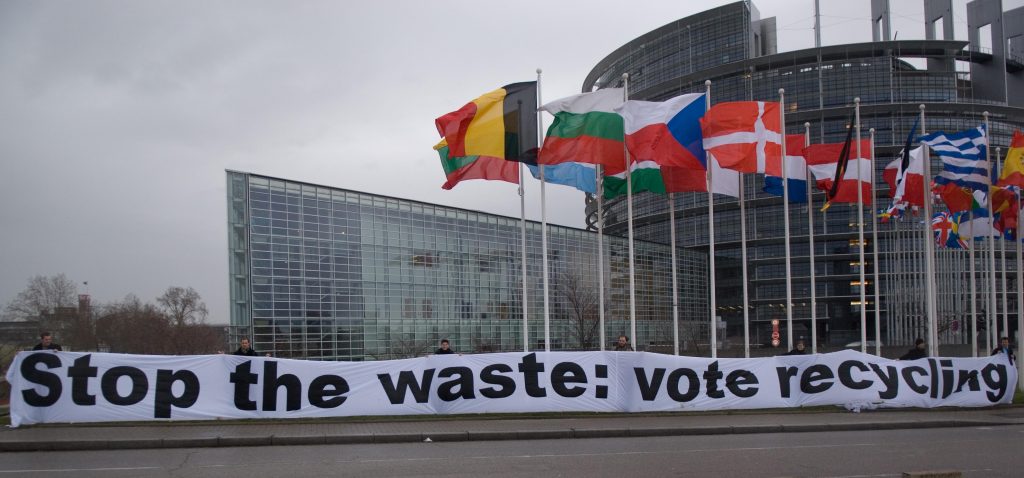Brussels, 17 June 2008 – Environmental NGOs are deeply disappointed with today’s European Parliament vote on the revised Waste Framework Directive. Parliament accepted a pre-arranged deal that sets inadequate European recycling targets and no target for waste prevention [1].
A number of MEPs made a last-ditch attempt to re-insert the Parliament’s original stronger targets [2], but this was defeated. Member States are now expected to ratify this deal which will become law by the end of 2008.
Nathalie Cliquot, waste policy officer of the European Environmental Bureau (EEB) said: “Everyone understands that increasing waste and sustainable development do not go together, yet pressure from EU Governments led to postponing discussions for common prevention targets until 2014. Nevertheless, governments are required to implement waste prevention programmes and the Commission has the difficult task of ensuring that they deliver – it should swiftly propose common prevention targets.”
Dr Michael Warhurst of Friends of the Earth Europe (FOEE) said: “This vote gives the EU its first ever general recycling targets; however they are too low to address the urgency of resource and climate threats. They also exclude too many significant waste streams and will be difficult to enforce. The Commission must now work hard to gather the information necessary so when targets are reviewed in 2014 they are made stronger, matching best practice around Europe.”
MEPs also agreed with a proposal to re-brand some incinerators as ‘recovery’ rather than ‘disposal’, a decision which ignored evidence that incineration contributes to climate change rather than acts as a climate solution [3]. Incineration is also inflexible and expensive and can limit recycling rates, as reflected by Denmark’s opposition to a mandatory 50 per cent household recycling rate because they already have too many incinerators. Given the clear need for – and achievability of – higher recycling targets, Member States cannot afford to put in place such expensive and inflexible residual waste technologies.
Dr Michael Warhurst of Friends of the Earth Europe said: “EU governments should be planning for future increases in recycling and prevention targets, not wasteful and expensive incineration.”
EEB and FOEE are also very concerned that MEPs supported a loose definition of ‘by-products’, which will allow many materials that are currently classified as waste to escape from safety controls.
Nathalie Cliquot of EEB said: “Allowing potentially hazardous materials to escape waste controls – and even to be exported to the developing world – through the new by-products definition is a serious error; the Commission must ensure strict controls are in place.”
***
NOTES:
For a more detailed analysis of the review of the Waste Framework Directive, see our policy briefing above
[1] The final deal requires countries to take “necessary measures designed to achieve” a target of 50 per cent recycling of some streams of household waste (glass, paper, plastics, metals) and 70 per cent of construction and demolition waste, leaving other business wastes – more than 20 per cent of total waste – with no target. The legal obligation is on the measures rather than on meeting the targets, which will make enforcement more difficult for the Commission. The final deal has no waste prevention target, only a process to see if such a target should be established in 2014.
[2] Parliament’s Environment Committee proposed a binding target of 50 per cent recycling of household waste and 70 per cent of business waste by 2020, and for the stabilisation of total waste at 2009 levels by 2012. A 50 per cent household waste recycling target alone could save CO2 emissions equivalent to taking as much as 31 million cars off Europe’s roads, see: “Climate Protection Potentials of EU Recycling Targets”, Knut Sander , commissioned by the European Environmental Bureau and Friends of the Earth Europe: http://www.eeb.org/publication/documents/RecyclingClimateChangePotentials.pdf
[[3] “A changing climate for energy from waste?” Eunomia Consultants for Friends of the Earth, May 2006: http://www.foe.co.uk/resource/reports/changing_climate.pdf Summarised in “Dirty Truths: Incineration and Climate Change”, Friends of the Earth, May 2006: http://www.foe.co.uk/resource/briefings/dirty_truths.pdf





